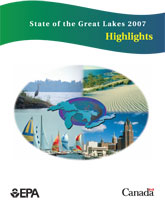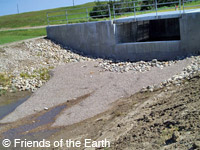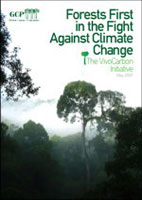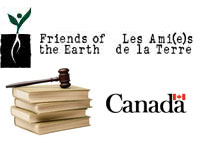
News |
- Canada's Water at Risk?
- Winnipeg/Manitoba to Protect Natural Areas
- Great Lakes Health Overshadowed
- Anti-Bottled Water Campaign Gains Momentum
- Devils Lake Outlet Flows Again
- Lake Winnipeg Research Consortium Honoured
- Value Carbon and Conserve Forests
- Exxon Remains Climate Change Dinosaur
- 2007 Manitoba Environmental Awards
- Sagkeeng Seeks Rights in Traditional Lands
- Canada to Court for Kyoto Failure
- DiCaprio Film on Environmental Crisis
| Canada's Water at Risk? | 27 June 07 |
 New research compiled by Sierra Club of Canada is raising troubling questions about the sovereignty of Canada's water resources.
New research compiled by Sierra Club of Canada is raising troubling questions about the sovereignty of Canada's water resources.Dr. Janet M Eaton, Sierra Club of Canada liaison to the Water Privatization Task Force of Sierra Club (U.S.), describes the Security and Prosperity Partnership (SPP) for North America, NAFTA Super-Corridors, and cross border regions like Atlantica and threaten Canadian water being put up for sale. Working groups under the SPP are looking at super corridors to not only transport goods but also transport energy and water. A Canadian House of Commons motion to open NAFTA talks to make sure bulk-water exports are excluded sparked a fierce, three-hour debate May 31, 2007, with all three opposition parties arguing against bulk water exports. The motion was tabled by the Standing Committee on International Trade in response to a document obtained by the Council of Canadians revealing that bulk water exports were discussed at a closed-door tri-national meeting in May 2007, involving Canada, Mexico and the United States. The motion passed in the House of Commons by a vote of 134 to 108. View the presentation, Threats to Our Water: NAFTA, SPP, Atlantica, Super-Corridors(PDF) Visit the Sierra Club of Canada Water Exports webpage View the June 21, 2007 World Net Daily article View the June 6, 2007 Council of Canadians press release View the June 1, 2007 CanWest News Service article View the June 8, 2007 article in the Tyee Source: Sierra Club of Canada, Council of Canadians, CanWest News Service
|
|
| Winnipeg/Manitoba to Protect Natural Areas | 27 June 07 |
 The Province of Manitoba and the City of Winnipeg signed a memorandum of understanding (MOU) June 14, 2007 that commits the parties to protect important conservation's waterways and natural areas within the City through Manitoba's Protected Areas Initiative.
The Province of Manitoba and the City of Winnipeg signed a memorandum of understanding (MOU) June 14, 2007 that commits the parties to protect important conservation's waterways and natural areas within the City through Manitoba's Protected Areas Initiative.Winnipeg would be the first Manitoba community with areas receiving provincial protected areas designation. Winnipeg and Manitoba have agreed to identify City of Winnipeg lands as candidates for protection, to facilitate protection of additional City of Winnipeg lands, and collaborate on habitat management and restoration within protected lands. "Winnipeg has historically significant waterways such as the Red River, forests and land base rich with wildlife and biodiversity," said Minister Struthers. "Today's agreement represents a historic first step for the city toward expanding protection and conservation efforts for these natural treasures." Manitoba Wildlands director Gaile Whelan Enns commented; "We are glad to see this step being taken. This means that tall grass prairie sites, the Assiniboine Forest, The Spirit Woods, Seine River corridor, and many others, can all finally be protected. We assume of course that provincial protection standards will be maintained, with good access to technical information." View the June 14, 2007 Government of Manitoba press release View the June 14, 2007 MOU between the City of Winnipeg and the Government of Manitoba(PDF) View Manitoba Wildlands' Protected Areas Announcements page Source: Government of Manitoba
|
|
| Great Lakes Health Overshadowed | 25 June 07 |
 The health of the Great Lakes ecosystem is improving in some ways, but impacts of population growth, climate change and invasive species continue to raise troubling concerns about the future of the Lakes.
The health of the Great Lakes ecosystem is improving in some ways, but impacts of population growth, climate change and invasive species continue to raise troubling concerns about the future of the Lakes.A new report by Environment Canada and the U.S. Environmental Protection Agency examines chemical, physical and biological integrity of the Great Lakes ecosystem and summarizes information provided in reports presented at the biennial State of the Lakes Ecosystem Conference. The good news is the Great Lakes continue to be a good source for treated drinking water and levels of toxic chemicals have been significantly reduced over the last 30 years. Climate change is expected to have a significant impact on the Great Lakes region and could lead to irreversible damage, said Maude Barlow of the Council of Canadians. An altered climate and lower water levels would affect wetlands and continue to force wildlife from their natural habitats, Barlow said. View the report, State of the Great Lakes 2007 Highlights (PDF) Visit the US-Canada State of the Lakes Ecosystem Conference website View the June 7, 2007 US Environmental Protection Agency press release View the June 11, 2007 CBC article View the June 11, 2007 Canadian Press article on CBC Source: Canadian Press, US Environmental Protection Agency
|
|
| Anti-Bottled Water Campaign Gains Momentum | 25 June 07 |
 The international anti-bottled water campaign is gaining momentum. Soon drinking bottled water may join the ranks of such socially passé trends as smoking.
The international anti-bottled water campaign is gaining momentum. Soon drinking bottled water may join the ranks of such socially passé trends as smoking.Groups in San Francisco and New York are battling to re-brand tap water's tarnished image by serving it in restaurants. A growing citizen base is targeting unnecessary pollution generated and energy expended in bottled water production and shipping, plus plastic bottles that rarely get recycled. The City of Toronto is pitching tap water as the cheaper, greener - and healthier alternative to bottled water. The latest City of Toronto reusable sports bottle includes a label reading FILL WITH TORONTO'S QUALITY TAP WATER. Toronto Mayor David Miller decided to serve jugs of tap water at council meetings and press conferences. "Bottled water is totally unnecessary," Mr. Miller states unequivocally. "Our tap water is purer than Perrier." Moral issues are adding to environmental arguments against bottled water. Recently, church groups, including the United Church of Canada, advocated members boycott the products on the grounds that water is a basic human right, not a commodity to be sold for profit. View the June 6, 2007 article on CityNews View the May 30, 2007 AlterNet article View the May 20, 2007 Los Angeles Times article View the May 14, 2007 MacLeans Magazine article View the May 12, 2007 Globe and Mail article on the Polaris Institute website Source: MacLeans, Globe and Mail, AlterNet
|
|
| Devils Lake Outlet Flows Again | 21 June 07 |
 North Dakota (ND) opened the gates at the Devils Lake outlet for the first time in 2007 on June 11, 2007, at 2:00pm.
North Dakota (ND) opened the gates at the Devils Lake outlet for the first time in 2007 on June 11, 2007, at 2:00pm.An account from a local farmer suggests that the 'temporary' filter - a rudimentary rock and gravel barrier - is allowing fish to move through the outlet. Friends of the Earth Canada (FOE) has written an open letter to Prime Minister Harper, President George Bush, Manitoba Premier Gary Doer, North Dakota Governor John Hoeven and Minnesota Governor Tim Pawlenty, calling the leaders to account for their commitments to make the first IJC year of outlet testing results public, and to report on installation of the advanced filter or disinfection system agreed to in 2005. The Manitoba government is launching a further appeal of the ND Health Department decision to modify the Devils Lake outlet operating permit, after being rejected in North Dakota's District Court in April 2007. In 2006, the North Dakota Department of Health weakened the sulphate standards of the outlet's operating permit, allowing Devils Lake waters to be discharged into the Sheyenne River. Sulphate levels are estimated to be 10 times higher in Devils Lake than in Lake Winnipeg. Manitoba is also concerned about the risk of alien species being transferred from Devils Lake downstream into the Sheyenne River and Hudson Bay basin, which includes Lake Winnipeg. Canadian Members of Parliament rallied support for resolving the Devils Lake issue. Led by Winnipeg North MP Judy Wasylycia-Leis, fifty federal politicians voted unanimously in favour of a motion calling on Ottawa to pressure the United States and North Dakota to close the controversial Devils Lake outlet. View June 15, 2007 CBC article Visit June 13, 2007 Government of Manitoba press release View June 13, 2007 FOE Canada open letter to US and Canadian politicians View June 14, 2007 letter to FOE Canada from Farmer, Leo Walker View June 14, 2007 House of Commons release Source: CBC, Government of Manitoba, Friends of the Earth Canada
|
|
| Lake Winnipeg Research Consortium Honoured | 21 June 07 |
 At a gala ceremony in Montreal on June 4, 2007, the Lake Winnipeg Research Consortium (LWRC) was honoured with a Silver Award in the Environmental Health Category as part of the 2007 Canadian Environment Awards.
At a gala ceremony in Montreal on June 4, 2007, the Lake Winnipeg Research Consortium (LWRC) was honoured with a Silver Award in the Environmental Health Category as part of the 2007 Canadian Environment Awards.The LWRC was recognized for its research on the ecology of Lake Winnipeg and its efforts to promote public awareness of environmental issues facing the lake. Through regular research cruises, LWRC collects data, monitors water quality and shares this information with the public. The Canadian Environment Awards was established by Canadian Geographic in 2002 and celebrates the stories of individuals and groups of Canadians who have made outstanding contributions to the protection, restoration and preservation of the environment through grassroots environmental action. View the June 4, 2007 Canadian Geographic press release (PDF) Visit the list of finalists for the Community Award for Environmental Health as part of the 2007 Canadian Environment Awards View the Lake Winnipeg Research Consortium website Source: Government of Manitoba, Canadian Geographic
|
|
| Value Carbon and Conserve Forests | 19 June 07 |
 A new report suggests global deforestation could be reduced if new markets for ecosystem services are in place and that such mechanisms could play a significant role in decreasing global greenhouse gas (GHG) emissions.
A new report suggests global deforestation could be reduced if new markets for ecosystem services are in place and that such mechanisms could play a significant role in decreasing global greenhouse gas (GHG) emissions.The report by the Global Canopy Programme's VivoCarbon Initiative points out 18-25% of global GHG emissions are from deforestation and the world's forest trees and soils contain twice as much carbon as is in the earth's atmosphere. It warns if deforestation is not curbed, ecosystem services critical to humanity - such as biodiversity, climate buffering, rainfall generation and soil stabilization - will be lost, causing severe impacts on food, energy and environmental security. The VivoCarbon Initiative presents a vision of the future where market mechanisms support conservation of carbon stocks in standing forests, ecosystem services are accounted for in our econom, and payments for maintaining intact ecosystems are possible. The Global Canopy Programme (GCP) speaks for an alliance of international scientists active in understanding interactions between forests and the atmosphere in relation to climate change. Visit the Global Canopy Programme's VivoCarbon Initiative webpage View the May 2007 VivoCarbon Initiative report, Forests First in the Fight Against Climate Change(PDF) Source: Global Canopy Programme
|
|
| Exxon Remains Climate Change Dinosaur | 19 June 07 |
 At its annual shareholder meeting in Dallas May 30th, 2007 Exxon Mobil shareholders voted against several resolutions proposed by investors.
At its annual shareholder meeting in Dallas May 30th, 2007 Exxon Mobil shareholders voted against several resolutions proposed by investors.Resolutions for Exxon to disclose information about carbon dioxide emissions generated by gasoline or diesel purchases at fuel stations; set goals to reduce greenhouse gas emission; boost its sourcing of renewable energy; and report on its impact on the environment were voted down at the meeting. Executives including Exxon Mobil chairman and chief executive Rex Tillerson urged shareholders to reject the motions. The votes marked defeat for a group of large public pension funds who are Exxon Mobil shareholders including: the California Public Employees Retirement System, the biggest US public pension fund; and the New York City Employees Retirement System, among others. Last year Exxon Mobil's profits were approximately US$39.5 billion. View the May 30, 2007 Forbes article View the May 31, 2007 article in The Independent View the May 31, 2007 Washington Post article Source: Forbes, The Independent, Washington Post
|
|
| 2007 Manitoba Environmental Awards | 19 June 07 |
 Janine Gibson and the Harvest Moon Society are recipients of the Manitoba Eco-Network Environmental Awards for 2007.
Janine Gibson and the Harvest Moon Society are recipients of the Manitoba Eco-Network Environmental Awards for 2007.These Annual Awards were established in 1990 to recognize "significant contributions to the awareness and protection of Manitoba's environment". These community awards celebrate the work of Manitobans in the challenges of environmental work. Janine Gibson was recognized as an individual by the Manitoba Eco-Network. She is the Chairperson and one of the founders of the Organic Food Council of Manitoba, and has been instrumental in establishing Canada's Organic Standard for agriculture. She has served as co-Chair of the Manitoba Eco-Network's Water Caucus and volunteered with HogWatch Manitoba. Janine advocates for the humane treatment of animals, food security and the importance of high quality locally-produced foods. Her farm is solar and wind powered. The Harvest Moon Society was recognized for bringing together rural and city people in celebrating and learning about sustainable food production and rural living. Its annual Harvest Moon Festival - a well-received music festival featuring local talent, and local food - regularly attracts hundreds of participants. View the June 5, 2007 Manitoba Eco-Network press release(DOC) Visit the Harvest Moon Society website Source: Manitoba Eco-Network
|
|
| Sagkeeng Seeks Rights in Traditional Lands | 14 June 07 |
 Sagkeeng First Nation has launched a precedent-setting lawsuit against the provincial and federal governments to gain control over three million square kilometers of traditional lands. Reserve lands for Sagkeeng First Nation are located on both sides of the mouth of the Winnipeg River, at Lake Winnipeg.
Sagkeeng First Nation has launched a precedent-setting lawsuit against the provincial and federal governments to gain control over three million square kilometers of traditional lands. Reserve lands for Sagkeeng First Nation are located on both sides of the mouth of the Winnipeg River, at Lake Winnipeg.The First Nation is seeking an agreement and mechanism to give the 6,300 band members a say in use and development of their traditional lands, which encompass Pine Falls, Powerview, Lac du Bonnet, Pinawa, Pointe du Bois, and significant portions of the Whiteshell and Nopiming provincial parks, plus lands in between. The east side First Nation is not interested in displacing or disrupting communities or residents, but is determined to reclaim its title to this land. Sagkeeng is arguing the first three treaties negotiated by the Canadian government did not contain an "extinguishment" provision (which would prevent any future claims on any other lands). Sagkeeng Chief Donavan Fontaine said, "This action is about recognizing that our people never surrendered their rights to the use and access to traditional lands which we have used for thousands of years - and it is about reconciling the loss of access and use to non-surrendered lands where our rights were never extinguished." If successful, the suit would likely result in the first comprehensive land treaty negotiated in Manitoba in more than 100 years. View the June 9, 2007 Winnipeg Free Press article (DOC) View the June 12, 2007 Grassroots News front page article Source: Winnipeg Free Press, Grassroots News
|
|
| Canada to Court for Kyoto Failure | 13 June 07 |
 Friends of the Earth Canada launched a landmark lawsuit against the Government of Canada for abandoning its international commitments under the Kyoto Protocol. Filed in Federal Court in Ottawa May 28, 2007 by the Sierra Legal Defense Fund, the lawsuit alleges the federal government is violating Canadian law by failing to meet its binding international commitments to reduce greenhouse gas emissions.
Friends of the Earth Canada launched a landmark lawsuit against the Government of Canada for abandoning its international commitments under the Kyoto Protocol. Filed in Federal Court in Ottawa May 28, 2007 by the Sierra Legal Defense Fund, the lawsuit alleges the federal government is violating Canadian law by failing to meet its binding international commitments to reduce greenhouse gas emissions.The lawsuit is an application for judicial review and alleges the government's failure to effectively regulate greenhouse gases is likely to violate the United Nations Framework Convention on Climate Change and the Kyoto Protocol. This violation contravenes section 166 of the Canadian Environmental Protection Act, which states Canada must abide by its international agreements in preventing pollution. "Canadians expect the Government of Canada to live up to its domestic and international commitments to combat global warming, and our environmental laws require it to do so," said Sierra Legal lawyer Robert Wright. View the May 29, 2007 Reuters article View the May 29, 2007 Friends of the Earth press release View the May 29, 2007 Sierra Legal Defense Fund press release View the May 28, 2007 application for judicial review (PDF) Source: FOE Canada, Sierra Legal, Reuters
|
|
| DiCaprio Film on Environmental Crisis | 13 June 07 |
 Hollywood star and longtime environmentalist Leonardo DiCaprio has released a film about the state of the world and how human beings impact our only home, planet earth.
Hollywood star and longtime environmentalist Leonardo DiCaprio has released a film about the state of the world and how human beings impact our only home, planet earth.The 11th Hour is a feature documentary produced, co-written, and narrated by DiCaprio. Interviews with 71 leading scientists, thinkers, experts and political heavyweights are woven together to create a compelling narrative about the most important issues that face our planet and people, today. The list of interviewees includes Canadians David Suzuki, Sheila Watt-Cloutier and Tzeporah Berman as well as Stephen Hawking, Mikhail Gorbachev, Paul Hawken and Wangari Maathai. The 11th Hour was specially screened at the Cannes Film Festival May 19th and will open in theaters in October 2007. View the May 19, 2007 ShowBizSpy.com article View the May 2007 Vanity Fair article Visit the website for the film The 11th Hour Visit Leonardo DiCaprio's Eco-Site Source: ShowBizSpy.com, Vanity Fair, LeonardoDiCaprio.org
|
|


 RSS Feeds:
RSS Feeds: